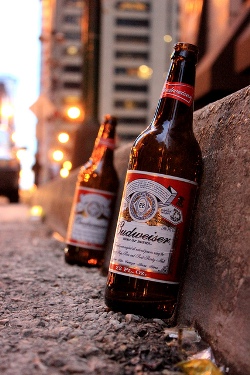Bloomberg Businessweek Report Looks At AB InBev Merger, Asks If It's Killing "The King Of Beers"
By Chuck Sudo in Food on Oct 30, 2012 9:45PM
AB InBev’s purchase of Goose Island last year still elicits a range of emotions supporting or opposing the move. (So far, it’s been a boon to Goose Island.) We never stopped to think of the people disappointed that Budweiser—the self-styled “King of Beers” and the first beer that comes to mind when casual beer drinkers think of as “American” beer—is now owned by a global company headquartered in Belgium.
Yet that’s the subject of a Bloomberg profile on AB InBev titled “The Plot to Destroy America’s Beer.” Bloomberg’s Devin Leonard looks at AB InBev four years after InBev bought Anheuser-Busch in a $52 million hostile takeover and sees what’s become of the behemoth company under CEO Carlos Brito: higher price points for beers like Budweiser and Bud Light; lower production costs; and the higher profit margins that make Wall Street analysts cream their custom tailored slacks quicker than a Thai massage. Leonard lists numerous instances where beer drinkers come to the realization that macro brands like Bud, Beck’s and Stella Artois are all being brewed at Anheuser-Busch plants across the country, and how they aren’t happy with it.
Leonard interviewed Brian Rinfret, who fell in love with Beck’s beer while in Germany and how he discovered modern versions of the beer he bought were brewed in American plants.
Rinfret, who is now 52, stopped on the way home from work at his local liquor store in Monroe, N.J., and purchased a 12-pack of Beck’s. When he got home, he opened a bottle. “I was like, what the hell?” he recalls. “It tasted light. It tasted weak. Just, you know, night and day. Bubbly, real fizzy. To me, it wasn’t German beer. It tasted like a Budweiser with flavoring.”He examined the label. It said the beer was no longer brewed in Bremen. He looked more closely at the fine print: “Product of the USA.” This was profoundly unsettling for a guy who had been a Beck’s drinker for more than half his life. He was also miffed to have paid the full import price for the 12-pack.
Rinfret left a telephone message with AB InBev (BUD), the owner of Beck’s and many other beers, including Budweiser. Nobody got back to him. He had better luck with e-mail. An AB InBev employee informed him that Beck’s was now being brewed in St. Louis along with Budweiser. But never fear, the rep told Rinfret: AB InBev was using the same recipe as always.
He wasn’t satisfied. In March, he posted a plea on Beck’s official Facebook (FB) page: “Beck’s made in the U.S. not worth drinking. Bring back German Beck’s. Please.” He had plenty of company. “This is a travesty,” a fellow disgruntled Beck’s drinker raged. “I’m pretty bummed,” wrote another. “I’ve been drinking this beer religiously for over 20 years.” Rinfret kept trashing Beck’s on Facebook. Until, he says, AB InBev unfriended him in May. “They banned me from their site. I can’t post anything on there any longer.”
Rinfret was only temporarily silenced. He now complains on a Facebook page called Import Beck’s from Germany. AB InBev may be paying a price for disappointing Beck’s loyalists like him.
Leonard notes that sales of brands like Beck’s and Budweiser are down in the U.S., but on the upswing internationally, which is all well and good for AB InBev’s bottom line. According to numbers Leonard cited from Beer Marketers Insights, shipments of Bud Light have declined 3 percent from 2009 through 2011 and Budweiser shipments have experienced a 12 percent drop. The company has also made cost-cutting moves like using cheaper hops in its major brands, which may help explain how Brian Rinfret discovered his Beck’s was now being brewed in the U.S.
The article also touches on the AB InBev purchase of Goose Island and how that clouds what is defined as a craft beer. Leonard writes of the decision to brew 312 Urban Wheat Ale (which Leonard calls “312 Imperial Pale Ale”) and other Goose Island flagship beers at AB plants. It freed Goose Island's Fulton Street brewery to focus on the specialty ales and experiments that have long been the stock in trade—Bourbon County Stout, for example, has never been easier to buy.
Graham Haverfield, beer director at the Wine Library in Springfield Township, N.J., told Leonard this decision by AB makes it harder for fans of Goose Island beers to trust where it’s being brewed.
“If I’m asked upfront by a customer, ‘Have you had this?’ Well, I don’t know,” he sighs. “The last time I had it, it was brewed in a different place.” He’s still a Goose Island fan, but he doesn’t know what AB InBev is doing with it. “I have a problem with a craft beer like Goose Island being treated like a mass-produced brand,” Haverfield says. “It’s a slippery slope.”
Leonard's article may or may not be the one AB InBev wants to read just as Goose Island is poised to become the company's national craft beer brand in November. Or they may not care so long as their ledger is flooded in black ink.
